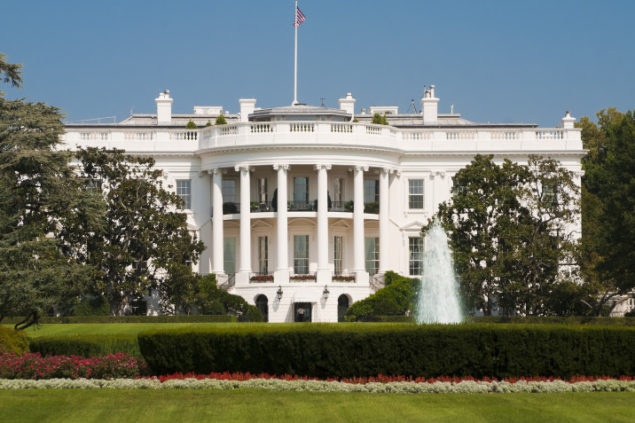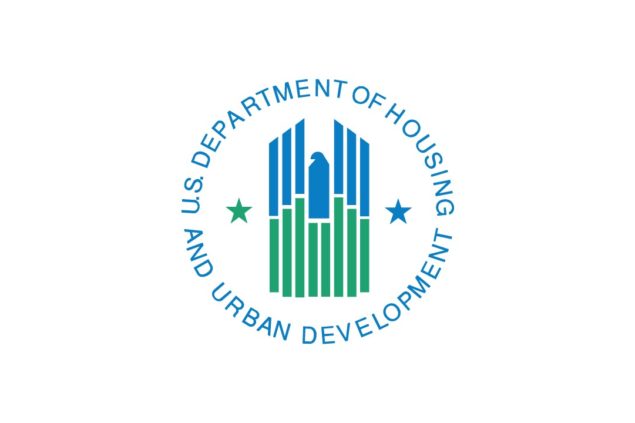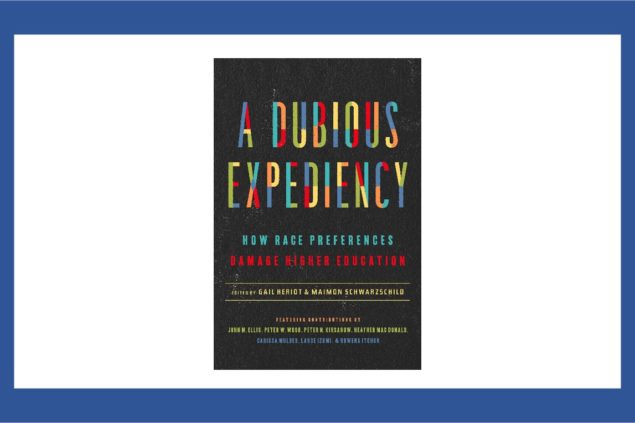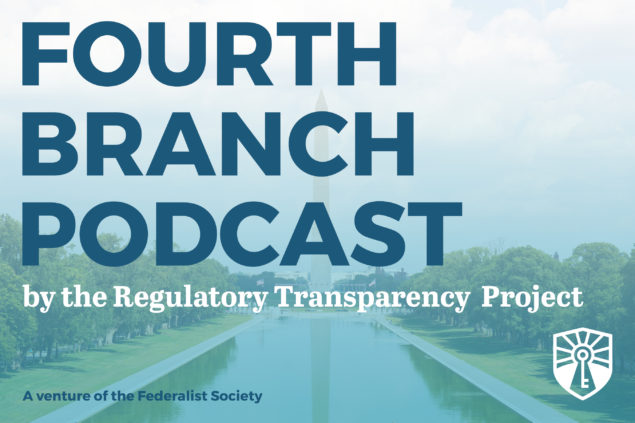Race & Sex
Topics
Current law tasks regulatory agencies with a significant role in promoting equality and reducing discrimination in our schools, workplaces, and throughout American society. How can we navigate this emotionally-charged area to identify regulatory actions that haven’t been effective or have had unintended consequences to propose solutions?
Ending Sex Discrimination in Campus “Sexual Misconduct” Proceedings
In this paper, Linda Chavez, Roger Clegg, and Stuart Taylor argue that Department of Education guidance documents infringed on the due process and free speech rights of those accused of sexual harassment or assault on college campuses, and proposes guidelines to address these concerns.
Read this paperA Review of Department of Education Programs: Transgender Issues, Racial Quotas in School Discipline, and Campus Sexual Assault Mandates
The authors of this paper explore the Department of Education’s enforcement of laws aimed at curtailing discrimination in education, and argue that there are “several areas where a single federal administrative agency has replaced the legitimate function of the legislature to define discrimination based on race, color, national origin, sex, and religion.”
Read this paperExplainer Episode 59 – Why (and How) Does OMB Classify Americans’ Race? A Brief History
It may surprise some to know that the government has definitive racial classifications for Americans, and it can be still…
Listen to this podcastDEI in the Executive Branch
On President Biden’s first day in office, he signed Executive Order 13985: Advancing Racial Equity and Support for Underserved Communities Through the…
Listen to this podcastRace & School Discipline
During President Obama’s second term, the U.S. Education Department began sharing studies indicating that black students were disciplined at higher…
Listen to this podcastExplainer Episode 56 – Affirmative Action in Employment
Affirmative action plans, though perhaps most associated with college admissions and higher education, actually crop up in a wide array…
Listen to this podcastExplainer Episode 47 – The Procedure of Title VI & IX Complaints
Title VI and IX apply to all colleges and universities that accept federal funds, which, as a condition of accepting those funds, agree they will enforce all Federal Civil Rights laws.
Listen to this podcastExplainer Episode 43 – An Agenda for Congress
In this episode, Hon. Gail Heriot, discusses her recent article for the New Criterion, An Agenda for Congress, in which she provides recommendations for Congress to adjust existing incentives that provide structural support for race-preferential admissions.
Listen to this podcastDeep Dive Episode 233 – Litigation Update: CFER v. Alameda & Raak Law v. Gast
Wen Fa provides a litigation update on two cases involving race-and-gender-based legal quotas.
Listen to this podcastDeep Dive Episode 216 – Title VI, College Admissions, and Public Opinion
Althea Nagai and Theodore Johnson joined Linda Chavez to discuss new research on public opinion regarding the use of race in college admissions.
Listen to this podcastDeep Dive Episode 212 – Litigation Update: Roberts v. Bassett: NY Racial Preferences in Allocating COVID Treatments
Wen Fa joined us to discuss the latest in his case challenging racial preferences in New York’s allocation of COVID-19 treatments.
Listen to this podcastDeep Dive Episode 207 – Litigation Update: Investigating Title VI and Title IX Complaints
Mark Perry joined Devon Westhill to provide an update on his civil rights advocacy and what he views as “troubling signs” at the Department of Education’s Office for Civil Rights.
Listen to this podcastDeep Dive Episode 202 – HUD and the Disparate Impact Rule
A panel of experts debates the pros and cons of a proposed HUD rule regarding disparate impacts.
Listen to this podcastDeep Dive Episode 192 – Gender Based Board Quotas, the Fourteenth Amendment, and Meland v. Weber
An expert panel discusses the underlying law and the likely next steps in Meland v. Weber, a case regarding gender based corporate board quotas in California.
Listen to this podcastDeep Dive Episode 191 – Talks with Authors: A Dubious Expediency
Gail Heriot and Maimon Schwarzschild discuss their recent book, which is a collection of essays examining the impact of racial diversity preferences in American colleges and universities.
Listen to this podcastDeep Dive Episode 186 – Teaching About Race in the Curriculum
This episode features a panel discussion on the current debates over how best to teach American history.
Listen to this podcastExplainer Episode 24 – The Future of Title IX Implementation
Edward E. Bartlett and Linda Chavez join the podcast to discuss the future of Title IX implementation under the Biden administration.
Listen to this podcastDeep Dive Episode 125 – The New Title IX Rules
This live podcast discusses and analyzes what new Title IX rulemaking means for students, schools, potential legal challenges, and future administrations.
Listen to this podcastDeep Dive Episode 91 – The Expected New Title IX Rules
Explainer Episode 10 – Did Harvard Admissions Discriminate Against Asians?
In Students for Fair Admissions, Inc. v. Harvard, it is alleged that Harvard admissions discriminated against Asians applicants. In this episode, Pacific Legal Foundation attorney Wen Fa discusses the case, the legal context in which the case was brought, and the case’s potential implications.
Listen to this podcastDeep Dive Episode 71 – Accounting for Race 101: Virginia Universities and Racial Preferences
This episode features audio from a September 10 panel that explored the implications of a study by the Center for Equal Opportunity that examines how five Virginia public universities preference certain applicants based on race.
Listen to this podcastDeep Dive Episode 52 – Race In Admissions: Texas Tech Medical School
The Texas Tech Medical School recently approved an agreement with the Department of Education’s Office for Civil Rights to end the use of racial preferences in their admissions process. Roger Clegg joins us to discuss the recent agreement and its implications.
Listen to this podcastContracts, Labor & Employment Law After SFFA
In June the U.S. Supreme Court issued its decision in Students for Fair Admissions Inc. v. President and Fellows of Harvard…
Watch this videoDEI in the Executive Branch
On President Biden’s first day in office, he signed Executive Order 13985: Advancing Racial Equity and Support for Underserved Communities Through the…
Watch this videoRace & School Discipline
During President Obama’s second term, the U.S. Education Department began sharing studies indicating that black students were disciplined at higher…
Watch this videoLitigation Update: CFER v. Alameda & Raak Law v. Gast
Wen Fa provides a litigation update on two cases involving race-and-gender-based legal quotas.
Watch this videoTitle VI, College Admissions, and Public Opinion
Althea Nagai and Theodore Johnson joined Linda Chavez to discuss new research on public opinion regarding the use of race in college admissions.
Watch this videoLitigation Update: Roberts v. Bassett: NY Racial Preferences in Allocating COVID Treatments
Wen Fa joined us to discuss the latest in his case challenging racial preferences in New York’s allocation of COVID-19 treatments.
Watch this videoLitigation Update: Investigating Title VI and Title IX Complaints
Mark Perry joined Devon Westhill to provide an update on his civil rights advocacy and what he views as “troubling signs” at the Department of Education’s Office for Civil Rights.
Watch this videoHUD and the Disparate Impact Rule
A panel of experts debates the pros and cons of a proposed HUD rule regarding disparate impacts.
Watch this videoGender Based Board Quotas, the Fourteenth Amendment, and Meland v. Weber
An expert panel discusses the underlying law and the likely next steps in Meland v. Weber, a case regarding gender based corporate board quotas in California.
Watch this videoTalks with Authors: A Dubious Expediency
Gail Heriot and Maimon Schwarzschild discuss their recent book, which is a collection of essays examining the impact of racial diversity preferences in American colleges and universities.
Watch this videoAccounting for Race 101: Virginia Universities and Racial Preferences
On September 10, 2019, The Federalist Society hosted a luncheon co-sponsored with the Center for Equal Opportunity (CEO). CEO released and presented a new study and report entitled “Race and Ethnicity in Undergraduate Admissions at Five Virginia Universities,” which examined how admissions programs at five Virginia public universities (University of Virginia, College of William & Mary, Virginia Tech, James Madison University, and George Mason University) preference certain applicants based on race. The results of the study and its implications for the broader academic discussion of racial preferences in college admissions were discussed by the panelists.
Watch this videoAre U.S. Colleges and Universities Barring Asian Applicants Based on their Race?
The Regulatory Transparency Project and the Center for Equal Opportunity co-sponsored a discussion on the admissions practices at elite colleges as they affect Asian American applicants.
Linda Chavez and her CEO colleagues presented and released a new study and report entitled “‘Too Many Asian Americans?’ Affirmative Discrimination in Elite College Admissions.” The CEO study illustrates that while Caltech admissions decisions are race-blind, its elite sister institutions Harvard University and MIT have established “ceilings”—or a limit—on Asian American acceptances. In addition to addressing the direct ramifications of their study’s findings, event panelists also discussed the unintended consequences of these admissions practices, whether current regulations are adequate to address issues of racial discrimination in college admissions, and what additional role government or civil society may play in redressing racially discriminatory admissions practices.
Watch this videoDepartment of Veterans Affairs Rule Doubles Down on Abortion
On March 4, 2024, the Department of Veterans Affairs (VA) finalized “without changes” an interim final rule (IFR) entitled “Reproductive Health Services.” (You can read my summary of the IFR here.)
Read this articleSupreme Court to Decide Whether EMTALA Preempts State Abortion Laws: Idaho v. U.S. and Moyle v. U.S.
Abortion is before the Supreme Court once again. This month, the Court granted certiorari in consolidated cases Moyle v. United States and Idaho v. United States.
Read this articleHHS Proposes Facilitating Abortions and Medical “Gender Transitions” for Unaccompanied Children
On October 4, 2023, the U.S. Department of Health and Human Services’ Administration for Children and Families (ACF) proposed new regulations “relating to the key aspects of the placement, care, and services provided to unaccompanied children” by the Office of Refuge Resettlement (ORR). The proposed rule titled, “Unaccompanied Children Program Foundational Rule,” is open for public comment until Monday, December 4, 2023.
Read this articleEEOC Enforcement Guidance on Harassment in the Workplace: Proposed Updates Raise Concerns
Rachel Morrison
Is It Lawful to Use Regulatory Impact Analysis to Achieve Equity?
J. Kennerly Davis, Jr.
Circular A-4, issued by the Office of Management and Budget (OMB), provides detailed guidance to federal agencies regarding the methodological attributes of sound regulatory impact analysis. The Biden administration has proposed modifications to Circular A-4 that were recently peer reviewed in preparation for the finalization and public release of a modified Circular A-4, perhaps by the end of this calendar year.
Read this articleThe Origins of the 2011 Dear Colleague Letter on Campus Sexual Assault
KC Johnson
Six years ago, I filed a FOIA request for various documents relating to the origin of the Dear Colleague letter, the 2011 Obama administration guidance on Title IX that sought to crack down on campus sexual assault by requiring universities to adjust their procedures to make it more likely that accused students would be found responsible.
Read this articleDo Title IX Proceedings Count as Legal Processes, or Don’t They?
KC Johnson
The Obama administration’s efforts to use Title IX to pressure universities to crack down on campus sexual assault transformed higher-education law. To date, 512 accused students have filed federal lawsuits (more than 200 have filed suit in state courts), and they’ve enjoyed surprising success—securing favorable rulings from the First, Second, Third, Fifth, Sixth, Seventh, Eighth, Ninth, and Tenth Circuit Courts of Appeal. The specific facts and legal theories vary from case to case. But the core issue remains whether campus procedures that “have been compared unfavorably to those of the infamous English Star Chamber” have sufficient procedural integrity to be reliable.
Read this articleRacial Preferences in Government Contracting: How It Happens and Why It’s Wrong
Wen Fa
Wen Fa discusses racial preferences and the public contracting process.
Read this articleWhy Did California’s Prop 16 Fail? A County-by-County Assessment
Althea Nagai
The numbers suggest that a majority of voters simply disliked racial/ethnic/gender preferences.
Read this articleReal Harms from Racial Discrimination in Harvard Admissions
Wen Fa
“If you are an Asian American — or even if you simply have an Asian or Asian sounding surname — you need to be careful about what you do and don’t say in your application.” That’s from The Princeton Review, and it’s indicative of what Asian-American teenagers can expect to read in college admissions guidebooks and hear from high school counselors.
Read this articleGood Intentions Gone Awry: Racial Quotas in Connecticut Schools
Wen Fa
Hartford, Connecticut is a modern day tale of two cities. The city has world-class magnet schools, where students have access to butterfly vivariums and some of the best education the state has to offer. Then there are failing neighborhood schools, where rust has changed the color of traffic signs and where many children’s hope for a brighter future have been extinguished.
Read this articleTexas Tech Abandons Racial Preferences in Medical School Admissions
Roger B. Clegg
Texas Tech’s medical school recently agreed to stop using racial and ethnic preferences in its admissions. This came about because of a complaint against Texas Tech filed in 2004 by my organization, the Center for Equal Opportunity, and the ensuing 15-year investigation by the Department of Education’s Office for Civil Rights, headed now under the Trump administration by Ken Marcus.
Read this articleTrump Administration Withdraws Guidance on Affirmative Action In Admissions
Alison Somin
On Wednesday, July 3, the Departments of Education and Justice announced that they withdrew a group of Obama-era guidances regarding the use of race in school admissions.
Read this articleAffirmative Discrimination Against Asian American Applicants in College Admissions
Althea Nagai
The Asian American population and the number of Asian Americans going to elite colleges in the United States have exploded in the past few decades. However, since the 1990s, some admissions officers seem to regard being Asian American as a “minus” factor in an application even as they see being black or Hispanic as a “plus.” It’s not as if a college explicitly states that it needs to cap the number of Asian Americans admitted so that more applicants who are not of Asian lineage can get in. Instead, commitments to “holistic admissions” and racial and ethnic “diversity” do the job.
Read this articleU.S. Commission on Civil Rights Report on Educational Equity – Commentary
Carissa Mulder
The U.S. Commission on Civil Rights recently released a report entitled, “Public Education Funding Inequity in an Era of Increasing Concentration of Poverty and Resegregation.” The report argues that children from low-income families tend to live in school districts that have less money than children from wealthier families. Despite the report’s emotional language, these funding gaps are not as stark as one might suppose.
Read this articleOutstanding New Article on “Disparate Impact” and School Discipline
Roger B. Clegg
Gail Heriot and Alison Somin have written an important article that will appear in the Texas Review of Law & Politics, “The Department of Education’s Obama-Era Initiative on Racial Disparities in School Discipline: Wrong for Students and Teachers, and Wrong on the Law.”
Read this article













































